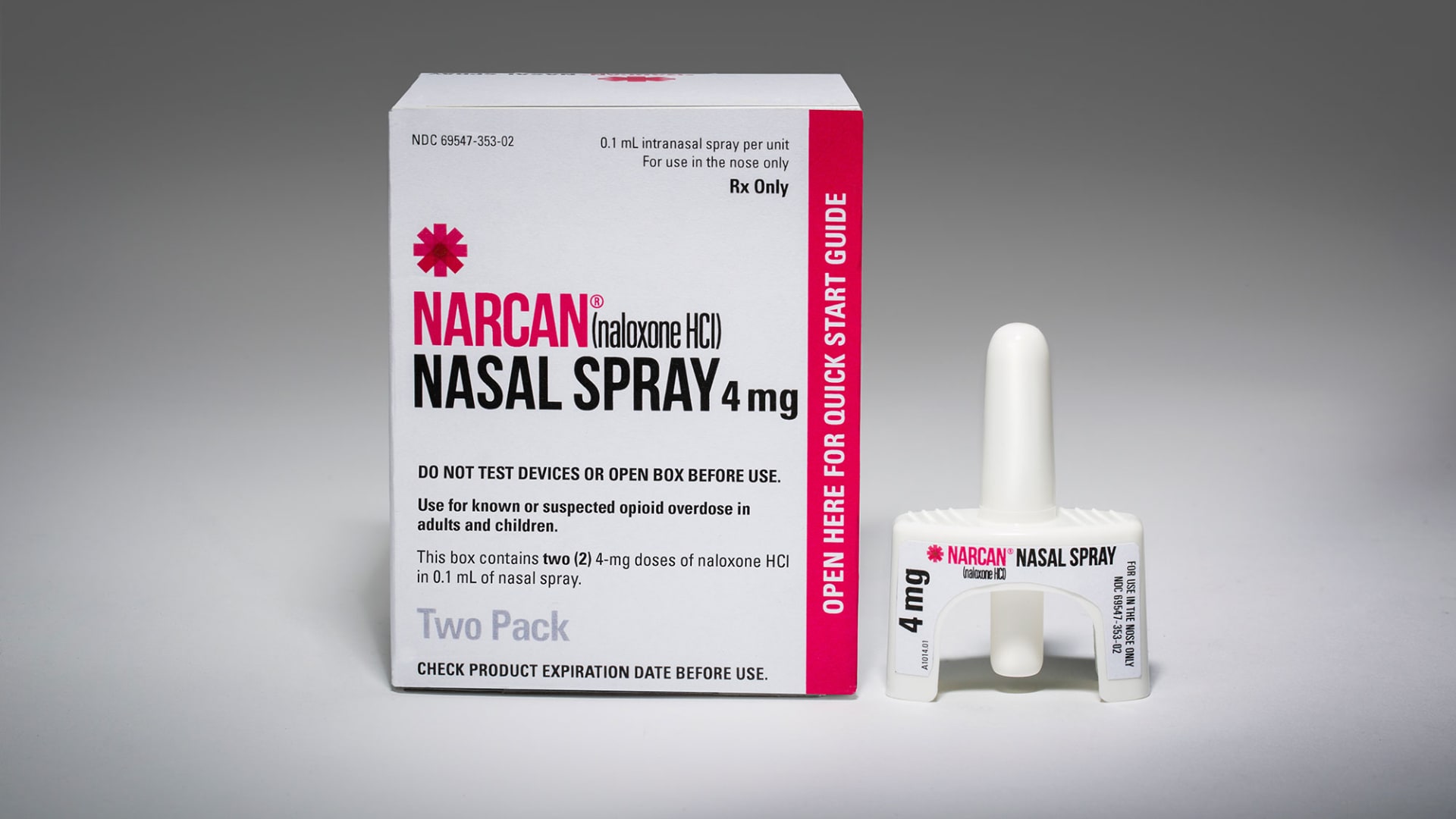
The Food and Drug Administration’s independent advisors on Wednesday unanimously recommended over-the-counter use of the nasal spray Narcan to reverse opioid overdoses, which would significantly expand access to the life-saving treatment.
Emergent BioSolutions‘ Narcan is the most commonly sold treatment for opioid overdoses. The FDA is expected to make a decision by March 29 on whether to allow people to buy the four milligram nasal spray without a prescription. The agency is not required to accept its advisors recommendation, though it typically does so.
“There is no reason to keep this as a prescription, let’s get it out there and save some lives,” said Elizabeth Coykendall, a paramedic at PM Pediatrics in Raleigh, North Carolina and a temporary voting member of the FDA committee.
Emergent BioSolutions said Narcan would be available for the over-the-counter market by late summer if the FDA approves it next month. The company has not yet disclosed how much it would cost.
“We have been working on distribution plans with key stakeholders like retailers and government leaders,” said Matt Hartwig, a spokesperson for the company.
Most states have already issued blanket prescriptions that allow pharmacies to distribute Narcan, generically known as naloxone, without the patient having to present a script. But FDA approval of Narcan for over-the-counter use would allow more people to acquire the treatment more easily in more places.
“If naloxone becomes a nonprescription product, it may be sold in many venues previously unavailable to consumers, including vending machines, convenience stores, supermarkets and big box stores, just like other nonprescription products,” Jody Green, an official at the FDA’s nonprescription drug division, told the advisory committee Wednesday.
Since 1999, more than 564,000 people have died from opioids in the U.S. in three waves — first from prescription opioids, then from heroin and most recently from fentanyl, according to the Centers for Disease Control and Prevention. Opioid overdose deaths spiked 17% during the pandemic from about 69,000 in 2020 to nearly 81,000 in 2021.
The Trump administration first declared the opioid epidemic a public health emergency in 2017. The Biden administration has renewed the emergency declaration every 90 days since the president took office.
“Each day 187 people will die — this is absolutely tragic as we think of not only the individuals themselves, but the families, the communities, the workplaces. This has profound human impact and we are all impacted from this,” Manish Vyas, senior vice president of regulatory affairs at Narcan maker Emergent BioSolutions, told the committee.
Scott Hadland, head of adolescent medicine at Massachusetts General Hospital, said the widespread infiltration of fentanyl into the nation’s drug supply has increased the risk of overdoses. Many people who are exposed to fentanyl take counterfeit pills that they thought were prescribed but actually contain the highly potent and often deadly opioid, Hadland said.
“And increasingly there are secondhand exposures that are also rising,” Hadland, who participated in Emergent BioSolutions’ presentation, told the committee. “We’re seeing rising overdose deaths among toddlers who are coming across fentanyl in public settings or fentanyl that may be elsewhere in the home.”
Hadland said he tells parents to keep Narcan at their home in case of an emergency. He compared it to a fire extinguisher that families should have for safety reasons but hopefully will never have to use.
“Unfortunately for most young people, families and community members all across this country, current avenues of access are challenging,” Hadland said.
Dr. Bobby Mukkamala of the American Medical Association said Narcan should be as easy to obtain as Tylenol to treat a headache or a decongestant for a stuffy nose. Narcan should be just as common in public places as AED devices that are used to treat people suffering from heart attacks, Mukkamala said.
Jessica Hulsey, executive director of the Addiction Policy Forum, told the committee during a public comment section that Narcan needs to be priced affordably at no more than $20 per dose if it’s sold over the counter. This is because Narcan is packaged as single doses and it can take multiple doses to reverse an overdose from highly potent fentanyl, Hulsey said.
Narcan displaces opioids that bind to receptor sites in a person’s nervous system. By displacing and blocking opioids, the nasal spray prevents fatal overdoses by reversing respiratory depression, said Gay Owens, head of global medical affairs at Emergent BioSolutions.
But Narcan has to be administered as soon as an overdose is suspected, which is why it’s crucial to make sure the instructions for using the nasal spray are simple, the FDA’s Green said. The FDA’s advisors grappled with how to make the instructions on the Narcan carton as clear as possible so anyone can use the device with ease in a life-threatening emergency.
In a study sponsored by Emergent BioSolutions, more than 90% of 71 participants understood over-the-counter label directions and used the Narcan device correctly during a simulated overdose emergency using mannequins. The participants included people with varying levels of literacy and both adults and adolescents.
But some participants were confused by the five-step instructions because they were split across the side and back panels of the carton, said Millie Shah, senior pharmacist at the FDA division that monitors errors in administering medicine. This confusion could result in delayed administration or errors in using the Narcan device correctly when time is of the essence, according to Shah.
These instances occurred despite the fact that the participants were allowed as much time as needed to familiarize themselves with the Narcan instructions, which may not be the case in a real-world overdose emergency, according to Shah.
“Therefore, the data collected does not capture this highest-risk use scenario,” said Shah.
The FDA has proposed that Emergent BioSolutions place all five instructions in sequential order on the back panel of the carton and also include instructions in the device blister pack. The company presented a mockup at the advisory meeting, but the FDA said it has not evaluated it yet.

